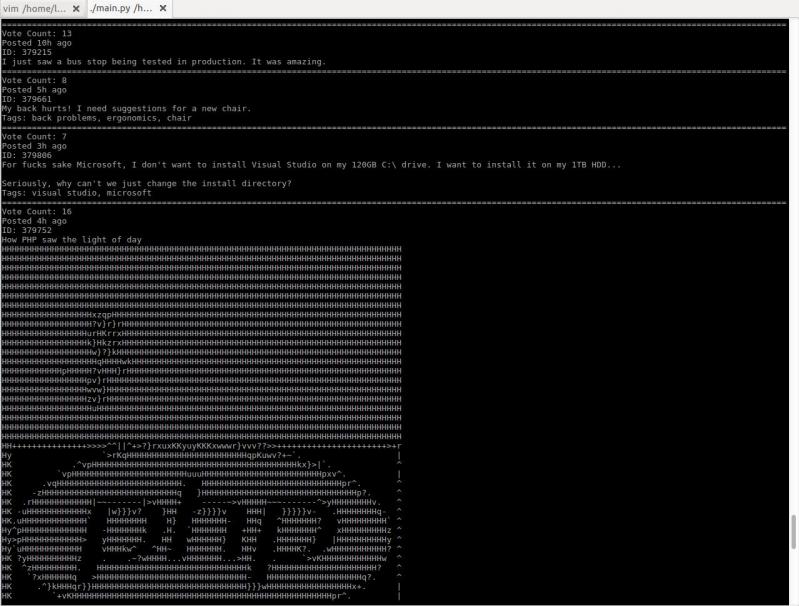Ranter
Join devRant
Do all the things like
++ or -- rants, post your own rants, comment on others' rants and build your customized dev avatar
Sign Up
Pipeless API

From the creators of devRant, Pipeless lets you power real-time personalized recommendations and activity feeds using a simple API
Learn More
Comments
-
@myss noob
I construct my own hardware and manually burn in the bits in a ROM package to create the application code -
@irene it's actually not that hard and you get boards for pretty good prices these days
-
@irene
I try to use the FPGA where I would normally use a MCU, basically for lols, so reading sensors and running motors/LEDs etc (it's quite nice because you don't need to poll or use interrupts, just make dedicated circuits).
I also made a packet switched network using the FPGA to route packets between multiple Arduino and ST boards over serial, that was fun. I plan to extend that to make my own cluster based on microcontrollers.
Naturally, some experiments with making processors, though my current attempt is laughable to say the least. It uses serial to transfer instructions from a PC and can only do basic math, no control instructions yet. I want to extend this by replicating the execution unit a bunch of times to make a SIMD array and try to run graphics operations on it (basically implement fused multiply add) and have it write the output to a small LCD display, thus creating the world's shittiest GPU. If FMADD works then maybe I could try running some basic ML on it too... -
@irene it would be a pretty large undertaking, you'd have to replicate the NES hardware exactly, quirks and bugs and all and I don't think my FPGA skills are quite there yet, but hey could be worth a try. Thankfully NES hardware is pretty well (unofficially) documented.
I'll have a look at it after the GPU thing is done.
Why don't you give it a go too? Buy an el cheapo board, a Verilog book, free software, and have at it! -
@endor I use a Numato Lab Mimas V2. Cheap-ish, has a ton of peripherals built in, and easily available in India (probably not a factor for you). Also straightforward to work with in Xilinx ISE, I don't use any advanced tools, too complex for my needs.
Price (duh), capacity, peripherals, tools, and tutorials/docs are the important factors. When you're starting out, price, peripherals, and tutorials are the most important, search for a relatively cheap board which a lot of people are writing about, because FPGA tools are weird and complex and can discourage you pretty quickly if you don't have a guide to follow.
If you're like me and want to write stuff from scratch, capacity (how big a design the thing can fit) is a non-issue when starting out, even the basic FPGAs like Spartan 3 are big enough to fit many hobby designs. If you want to use premade IP and advanced tools that make soft processors and load Linux/RTOS etc then you'll need a more expensive board. -
@endor another good board that I've seen is the Terasic DE0-Nano (or whatever the current equivalent is). I also really liked Cypress PSoC boards because they're a sort of mixed bag of FPGA and MCU, and pretty cheap. Sorry I don't have much experience with internationally available and popular boards (digilent stuff, Xilinx arty, etc.), kinda expensive here.
@irene stuff is pretty expensive here too, and a good project is worth it. Getting FPGA stuff working is pure magic because it's so low level. -
@irene isn't that a CPLD, not an FPGA? Also a bit too small iirc, you may get constrained pretty fast. I'd say a Spartan 3 (or altera/lattice equivalent) is a good place to start.
-
@irene units as in, programmable units? I don't remember the exact number, but from experience whatever you get in a basic Spartan 3/Spartan 6 (both have multiple variants with different capacities) is good enough for beginners like us. Look it up, I guess. Note that it may not make sense to compare numbers across manufacturers since they could count things differently (not sure, never really.looked into it).
Related Rants

 No questions asked
No questions asked As a Python user and the fucking unicode mess, this is sooooo mean!
As a Python user and the fucking unicode mess, this is sooooo mean! I just started working on a little project to browse devrant from terminal. It converts images to ascii art!
I just started working on a little project to browse devrant from terminal. It converts images to ascii art!
It depends! if u want the framework to be God then use Django, but if you want to be the God, then use Flask(but make sure you're a real God)
random
flask
python
django